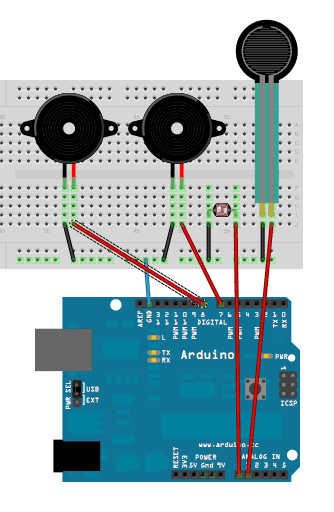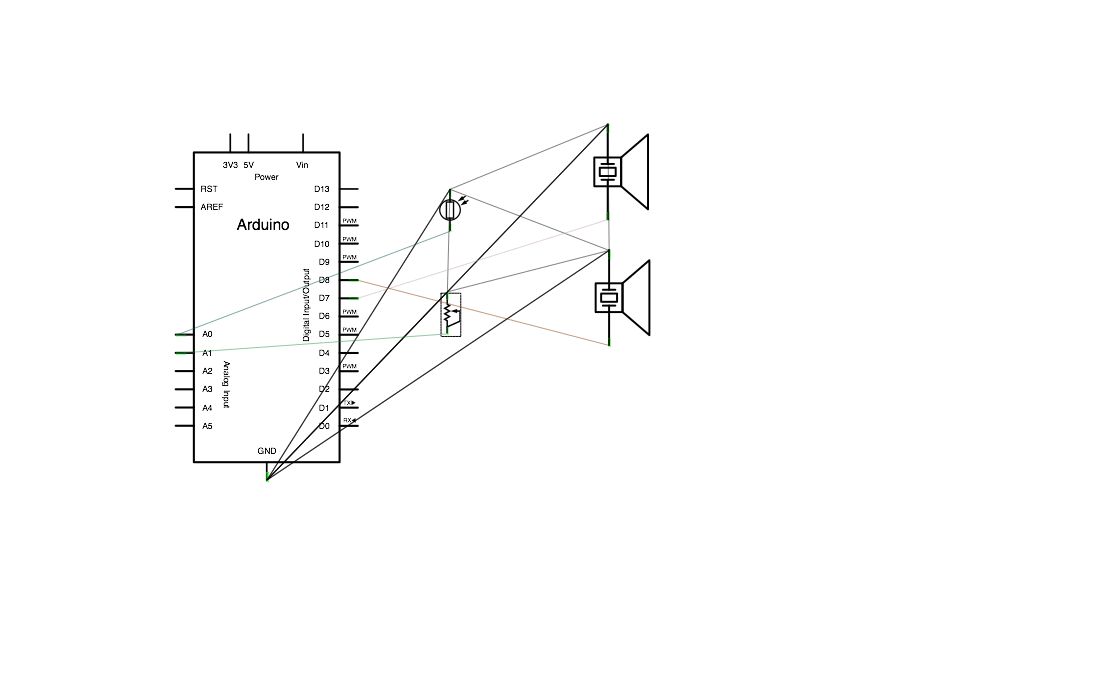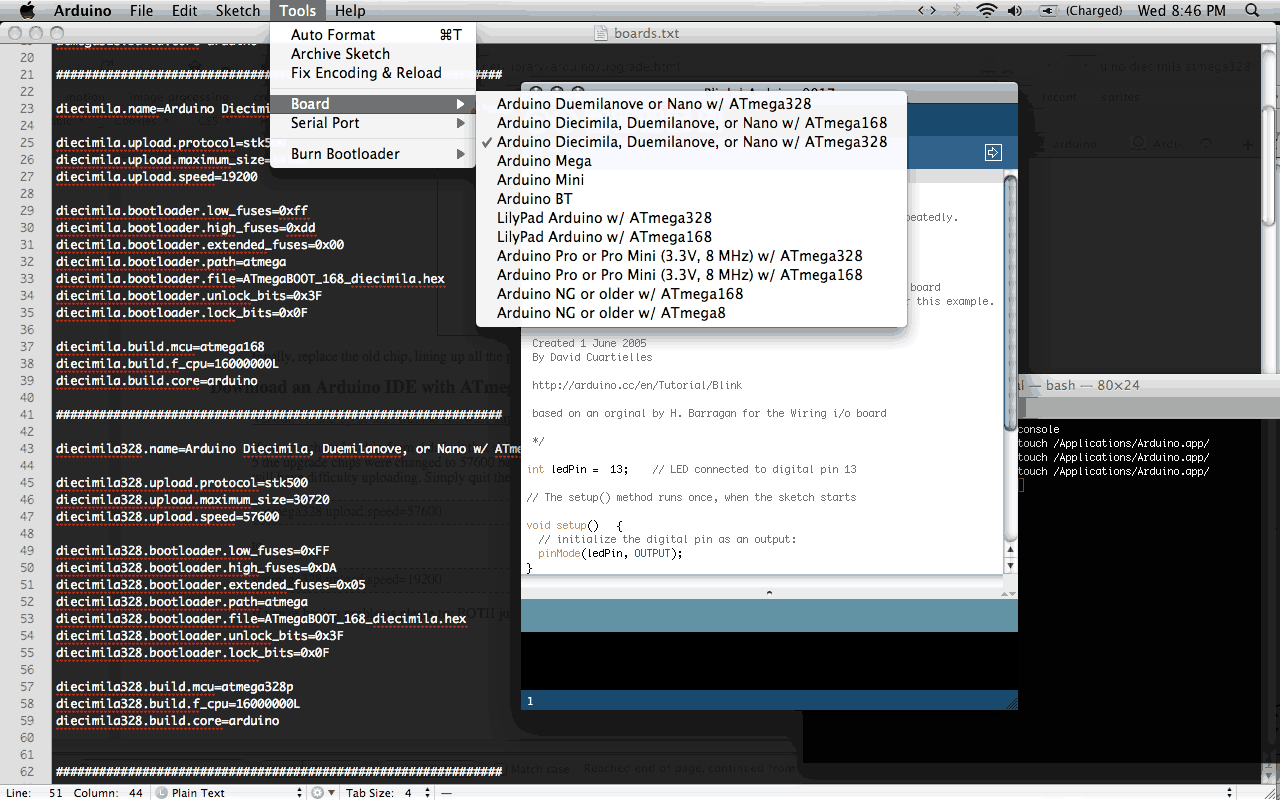George Profenza
From PhysicalComputing
Contents |
Sensor Buzzer Toy + WaveShield Toy
Aim
The Aim was to modify sounds by using sensors.
Ideally I would modify the pitch/volume of WAV files playing.
A Wave Shield would be use for the task.
Reseach:
Existing stuff found online looked pretty fun:
Wave Shield Fun
Old School Noise
More 8 bit joy
User Scenario
Although I had bigger plans that would involve drawing robots,
I had to settle for something less dramatic.
No gallery, no installation, just plain fun with old school noises...Yeah! I still play old school NES games!
Got a problem ?!
Development Process
I recently got my hands on a decent camera, so here are a few pictures from the development process:
Completed Wave Shield:
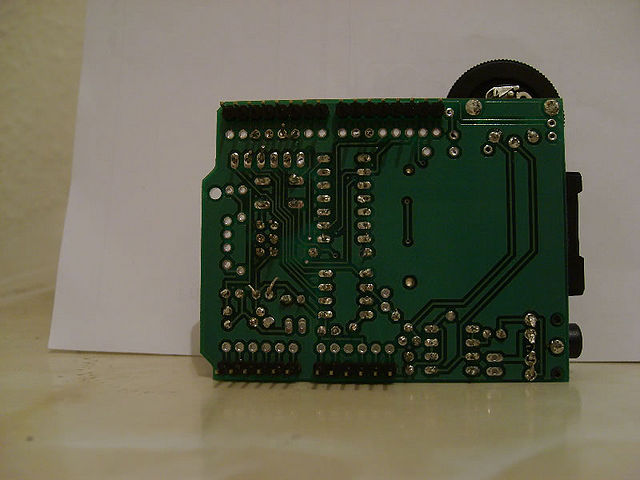
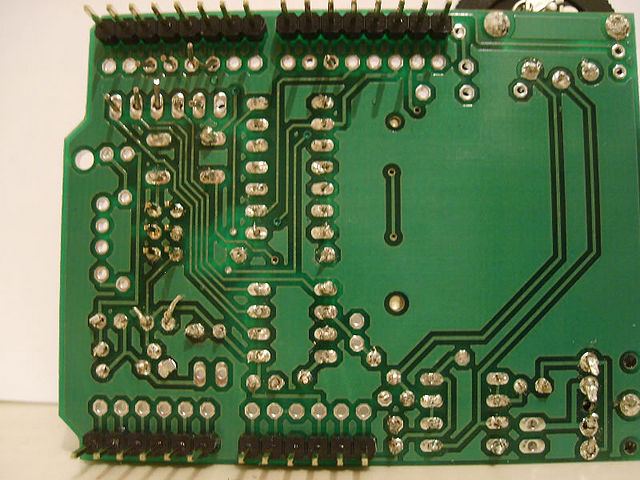
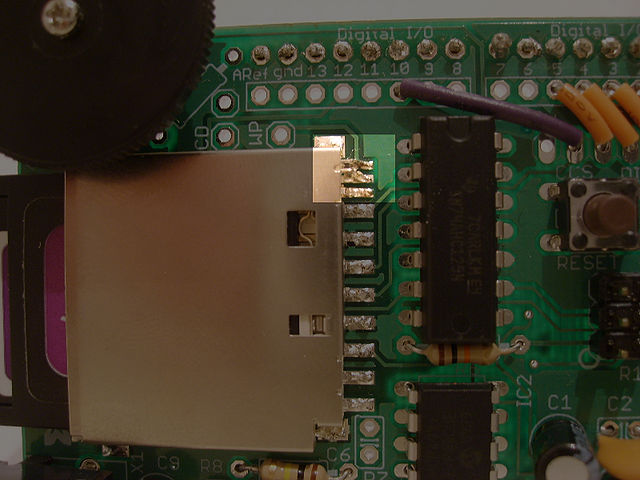
Smooth soldering action going on.
I don't see why there's not hit song called "Solder Boy!" :)
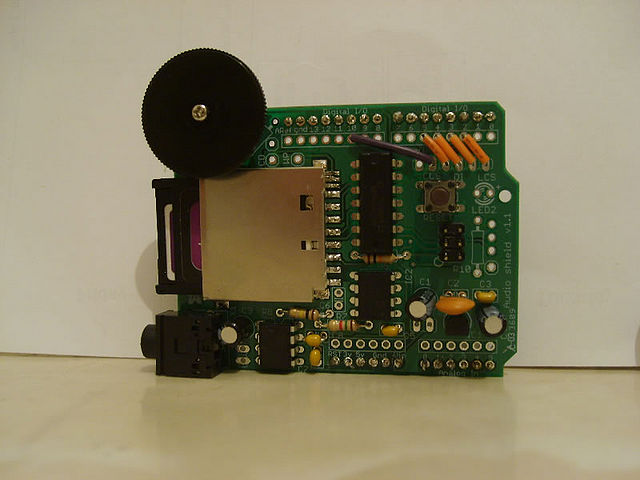
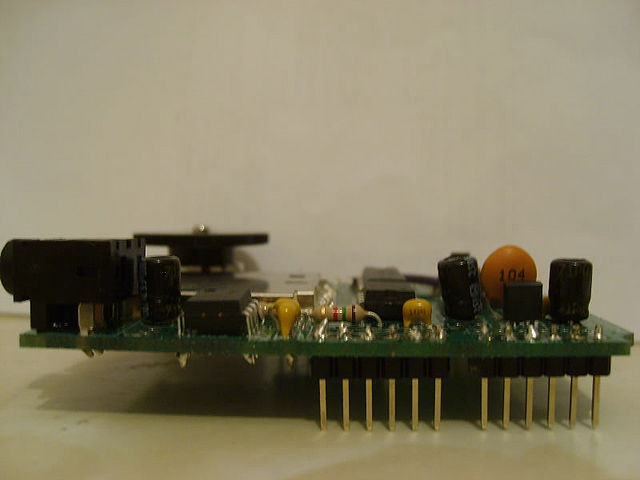
The huge 104 coded capacitor I had run to maplins to get, my kit missed 1.
The lovely WaveHC librarie problems:
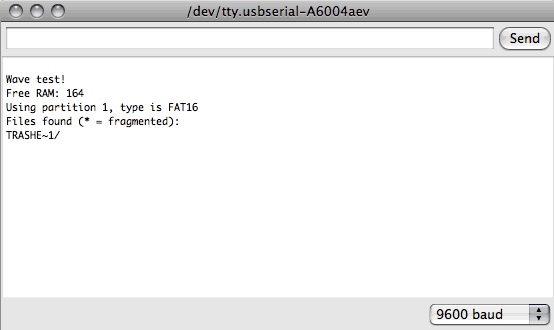
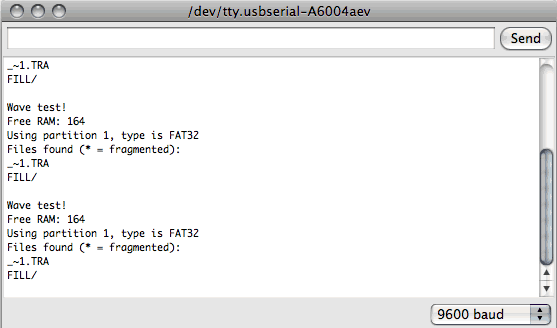
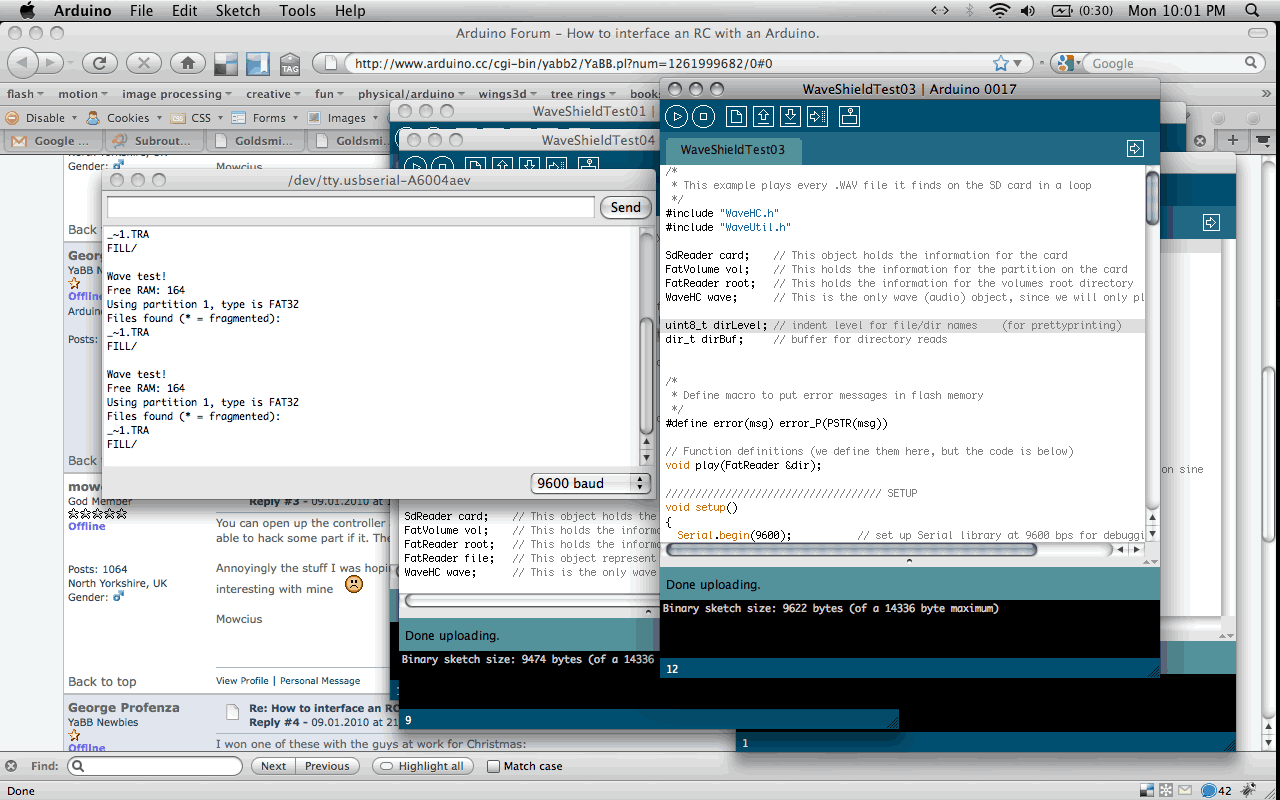
Problems with memory, not all files were read,
no chance to play a .wav
Never the less I settled for the simple approach:
Using a capacitive sensor, an Light Dependent Resistor(LDR),
a speaker and a Piezzo Buzzer I managed to get some noise using the
Tone Library.
The code looks like this:
#include <Tone.h>
//Tone objects
Tone beeperSmall; //small buzzer
Tone beeperBig; //big buzzer
//pin setup
int capacitiveSensorPin = 0; //press pin
int ldrSensorPin = 1; //LDR pin
/*int redPin = 12;//red LED
int uvPin = 11;//PWM UV LED
float duty = 0; //PWM duty
float angle = 0; //angle for cycle
float rad5 = PI/18;//for uvLED sine
float redValue = 0; //for red LED*/
//SENSOR READING
int vals[10]; //Declared our 10 position averaging array
int capacitiveValue = 0; //variable to store the value coming frm the center
int ldrValue = 0;
void setup(){
beeperSmall.begin(8);
beeperBig.begin(7);
//pinMode(uvPin,OUTPUT);
//pinMode(redPin,OUTPUT);
Serial.begin(9600);
for (int i=0;i<10;i++)
{
vals[i] = 0; //initialize the array
}
}
void loop(){
//analogRead gets values from 0 to 1023
capacitiveValue = average(analogRead(capacitiveSensorPin));
ldrValue = analogRead(ldrSensorPin);
//let's keep noiseMaker's pitch up to 1000
beeperSmall.play(capacitiveValue - 23);
beeperBig.play(ldrValue);
Serial.println(capacitiveValue);
Serial.println(ldrValue);
//PWM
/* angle += rad5;
if(angle > TWO_PI) angle = 0;
duty = abs(sin(angle) * 255);
analogWrite(uvPin,capacitiveValue*4);
redValue = random(0,100);
if(redValue > 75) digitalWrite(redPin,HIGH);
else digitalWrite(redPin,LOW);
delay(250);*/
}
int average(int newVal)
{
int total = 0;
for (int i = 9; i > 0; i--) //shift values by 1
{
vals[i] = vals[i-1];
total+=vals[i];
}
vals[0] = newVal;//add the newVal
total += vals[0];//sum it up
return total/=10;//divide and send
}
Final Outcome:
Old school noise is the result:
Lessons learned:
- fail early
- fail often
- keep trying
The Obvious:
I suck at time management
Update:
Disclaimer: I am adding new content as I have not given up
the wave shield that was almost done. Due to the fact that the display
date was delayed I have taken advantage to update this page. Any member
of the teaching staff may ignore the following content. This is for the
sake of documentation.
Ok, Gert was kind
enough to lend me an Atmel328 chip, as I had a 168 (50% less memory, older version).
Apparently downgrading a Duemilanove board to a 168 chip is straight forward and
there is an option in the Board list within the Arduino IDE.
Not the same for upgrading a Diecimila with a 328 chip. This doesn't make much sense
to me as more than likely you'll upgrade an older board with a newer chip rather than
the other way around.
In case anyone one's to do this, you need to create a board definition in the boards.txt file within Arduino's hardware folder. That is slightly more than the explanations on the LadyAda site.
In case anyone needs this, here are my custom boards definitions. I defined the diecimila328 by using most of the diecimila definition,
but using atmega328's definitions for maximum upload speed, (baud)speed, low, high and extended fuses and the mcu. Here's how it looks:
############################################################## atmega328.name=Arduino Duemilanove or Nano w/ ATmega328 atmega328.upload.protocol=stk500 atmega328.upload.maximum_size=30720 atmega328.upload.speed=57600 atmega328.bootloader.low_fuses=0xFF atmega328.bootloader.high_fuses=0xDA atmega328.bootloader.extended_fuses=0x05 atmega328.bootloader.path=atmega atmega328.bootloader.file=ATmegaBOOT_168_atmega328.hex atmega328.bootloader.unlock_bits=0x3F atmega328.bootloader.lock_bits=0x0F atmega328.build.mcu=atmega328p atmega328.build.f_cpu=16000000L atmega328.build.core=arduino ############################################################## diecimila.name=Arduino Diecimila, Duemilanove, or Nano w/ ATmega168 diecimila.upload.protocol=stk500 diecimila.upload.maximum_size=14336 diecimila.upload.speed=19200 diecimila.bootloader.low_fuses=0xff diecimila.bootloader.high_fuses=0xdd diecimila.bootloader.extended_fuses=0x00 diecimila.bootloader.path=atmega diecimila.bootloader.file=ATmegaBOOT_168_diecimila.hex diecimila.bootloader.unlock_bits=0x3F diecimila.bootloader.lock_bits=0x0F diecimila.build.mcu=atmega168 diecimila.build.f_cpu=16000000L diecimila.build.core=arduino ############################################################## diecimila328.name=Arduino Diecimila, Duemilanove, or Nano w/ ATmega328 diecimila328.upload.protocol=stk500 diecimila328.upload.maximum_size=30720 diecimila328.upload.speed=57600 diecimila328.bootloader.low_fuses=0xFF diecimila328.bootloader.high_fuses=0xDA diecimila328.bootloader.extended_fuses=0x05 diecimila328.bootloader.path=atmega diecimila328.bootloader.file=ATmegaBOOT_168_diecimila.hex diecimila328.bootloader.unlock_bits=0x3F diecimila328.bootloader.lock_bits=0x0F diecimila328.build.mcu=atmega328p diecimila328.build.f_cpu=16000000L diecimila328.build.core=arduino ############################################################## mega.name=Arduino Mega mega.upload.protocol=stk500 mega.upload.maximum_size=126976 mega.upload.speed=57600 mega.bootloader.low_fuses=0xFF mega.bootloader.high_fuses=0xDA mega.bootloader.extended_fuses=0xF5 mega.bootloader.path=atmega mega.bootloader.file=ATmegaBOOT_168_atmega1280.hex mega.bootloader.unlock_bits=0x3F mega.bootloader.lock_bits=0x0F mega.build.mcu=atmega1280 mega.build.f_cpu=16000000L mega.build.core=arduino ############################################################## mini.name=Arduino Mini mini.upload.protocol=stk500 mini.upload.maximum_size=14336 mini.upload.speed=19200 mini.bootloader.low_fuses=0xff mini.bootloader.high_fuses=0xdd mini.bootloader.extended_fuses=0x00 mini.bootloader.path=atmega mini.bootloader.file=ATmegaBOOT_168_ng.hex mini.bootloader.unlock_bits=0x3F mini.bootloader.lock_bits=0x0F mini.build.mcu=atmega168 mini.build.f_cpu=16000000L mini.build.core=arduino ############################################################## bt.name=Arduino BT bt.upload.protocol=stk500 bt.upload.maximum_size=14336 bt.upload.speed=19200 bt.upload.disable_flushing=true bt.bootloader.low_fuses=0xff bt.bootloader.high_fuses=0xdd bt.bootloader.extended_fuses=0x00 bt.bootloader.path=bt bt.bootloader.file=ATmegaBOOT_168.hex bt.bootloader.unlock_bits=0x3F bt.bootloader.lock_bits=0x0F bt.build.mcu=atmega168 bt.build.f_cpu=16000000L bt.build.core=arduino ############################################################## lilypad328.name=LilyPad Arduino w/ ATmega328 lilypad328.upload.protocol=stk500 lilypad328.upload.maximum_size=30720 lilypad328.upload.speed=57600 lilypad328.bootloader.low_fuses=0xFF lilypad328.bootloader.high_fuses=0xDA lilypad328.bootloader.extended_fuses=0x05 lilypad328.bootloader.path=atmega lilypad328.bootloader.file=ATmegaBOOT_168_atmega328_pro_8MHz.hex lilypad328.bootloader.unlock_bits=0x3F lilypad328.bootloader.lock_bits=0x0F lilypad328.build.mcu=atmega328p lilypad328.build.f_cpu=8000000L lilypad328.build.core=arduino ############################################################## lilypad.name=LilyPad Arduino w/ ATmega168 lilypad.upload.protocol=stk500 lilypad.upload.maximum_size=14336 lilypad.upload.speed=19200 lilypad.bootloader.low_fuses=0xe2 lilypad.bootloader.high_fuses=0xdd lilypad.bootloader.extended_fuses=0x00 lilypad.bootloader.path=lilypad lilypad.bootloader.file=LilyPadBOOT_168.hex lilypad.bootloader.unlock_bits=0x3F lilypad.bootloader.lock_bits=0x0F lilypad.build.mcu=atmega168 lilypad.build.f_cpu=8000000L lilypad.build.core=arduino ############################################################## pro328.name=Arduino Pro or Pro Mini (3.3V, 8 MHz) w/ ATmega328 pro328.upload.protocol=stk500 pro328.upload.maximum_size=30720 pro328.upload.speed=57600 pro328.bootloader.low_fuses=0xFF pro328.bootloader.high_fuses=0xDA pro328.bootloader.extended_fuses=0x05 pro328.bootloader.path=atmega pro328.bootloader.file=ATmegaBOOT_168_atmega328_pro_8MHz.hex pro328.bootloader.unlock_bits=0x3F pro328.bootloader.lock_bits=0x0F pro328.build.mcu=atmega328p pro328.build.f_cpu=8000000L pro328.build.core=arduino ############################################################## pro.name=Arduino Pro or Pro Mini (3.3V, 8 MHz) w/ ATmega168 pro.upload.protocol=stk500 pro.upload.maximum_size=14336 pro.upload.speed=19200 pro.bootloader.low_fuses=0xc6 pro.bootloader.high_fuses=0xdd pro.bootloader.extended_fuses=0x00 pro.bootloader.path=atmega pro.bootloader.file=ATmegaBOOT_168_pro_8MHz.hex pro.bootloader.unlock_bits=0x3F pro.bootloader.lock_bits=0x0F pro.build.mcu=atmega168 pro.build.f_cpu=8000000L pro.build.core=arduino ############################################################## atmega168.name=Arduino NG or older w/ ATmega168 atmega168.upload.protocol=stk500 atmega168.upload.maximum_size=14336 atmega168.upload.speed=19200 atmega168.bootloader.low_fuses=0xff atmega168.bootloader.high_fuses=0xdd atmega168.bootloader.extended_fuses=0x00 atmega168.bootloader.path=atmega atmega168.bootloader.file=ATmegaBOOT_168_ng.hex atmega168.bootloader.unlock_bits=0x3F atmega168.bootloader.lock_bits=0x0F atmega168.build.mcu=atmega168 atmega168.build.f_cpu=16000000L atmega168.build.core=arduino ############################################################## atmega8.name=Arduino NG or older w/ ATmega8 atmega8.upload.protocol=stk500 atmega8.upload.maximum_size=7168 atmega8.upload.speed=19200 atmega8.bootloader.low_fuses=0xdf atmega8.bootloader.high_fuses=0xca atmega8.bootloader.path=atmega8 atmega8.bootloader.file=ATmegaBOOT.hex atmega8.bootloader.unlock_bits=0x3F atmega8.bootloader.lock_bits=0x0F atmega8.build.mcu=atmega8 atmega8.build.f_cpu=16000000L atmega8.build.core=arduino
Here is a screen shot of the updated Boards list in the Arduino IDE:
Ok, back to the wave shield. I have finally got it to work, all the programming
issues were because my chip was running out of memory while reading the directory
list of an SD, not to mention play a file. Apparently all the soldering was fine
as the code worked well. Basic setup is: 1XUpgradedArduino, 1XWaveShield, 1X10KPotentiometer
and 1XLDR plus a few sample wav files from Max5.
I've decided to wrap the thing up a bit so it's not connected to the computer anymore.
Here are the new images:
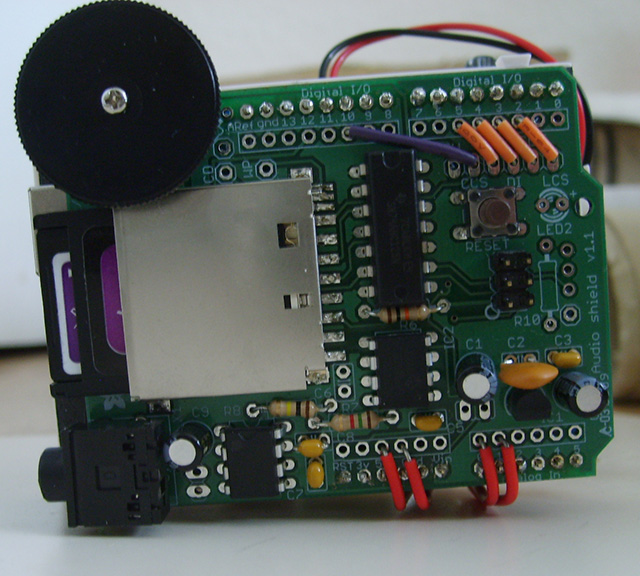
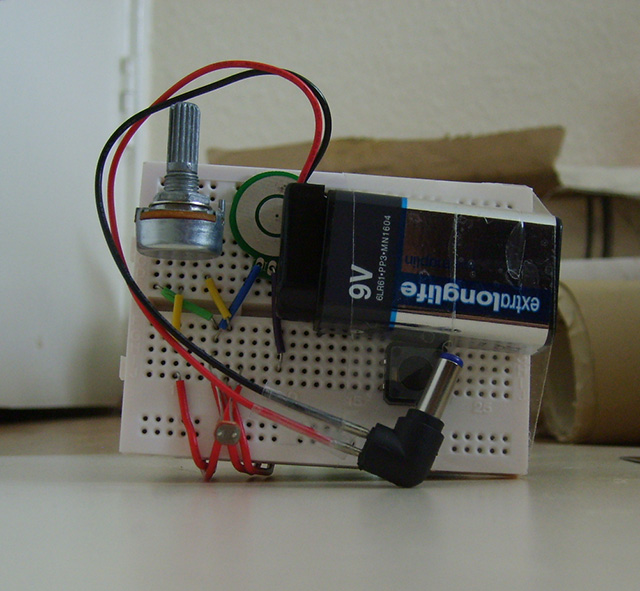
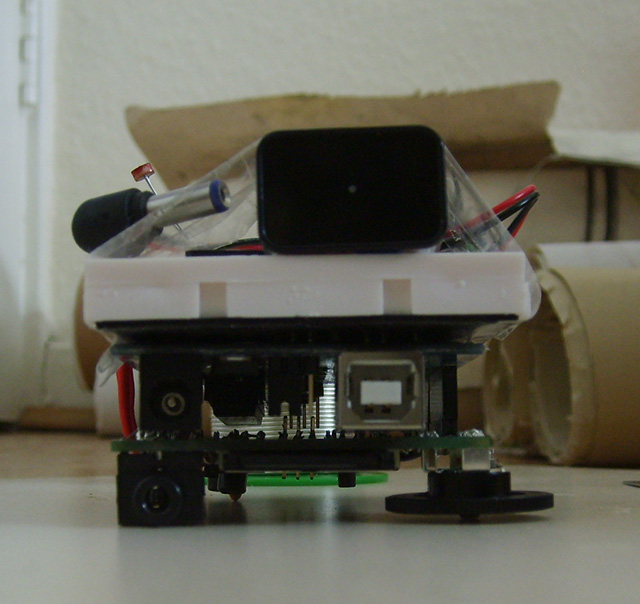
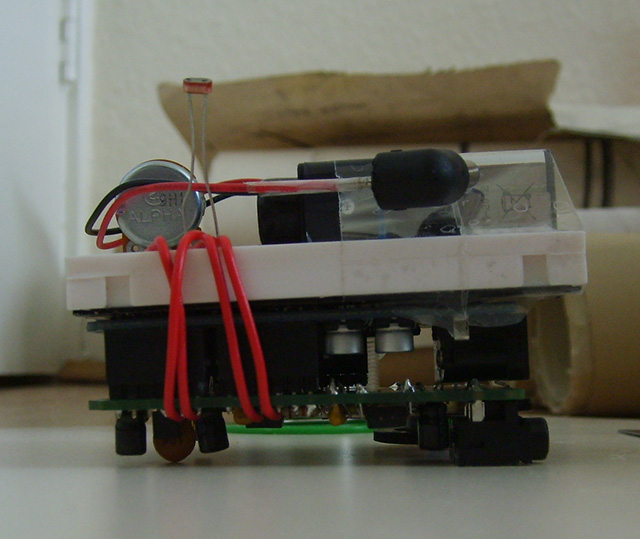
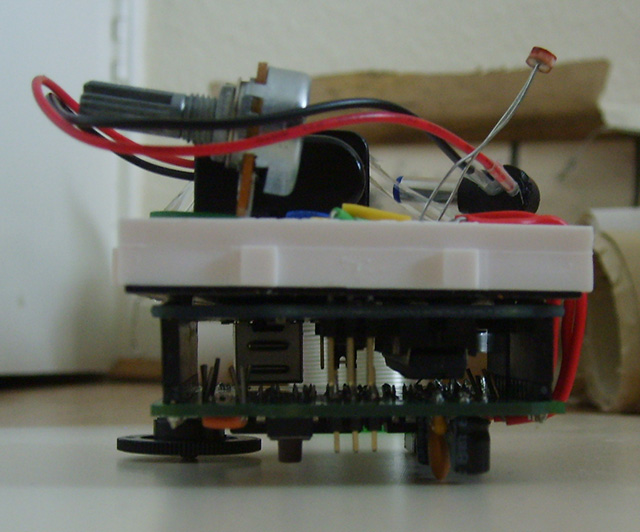
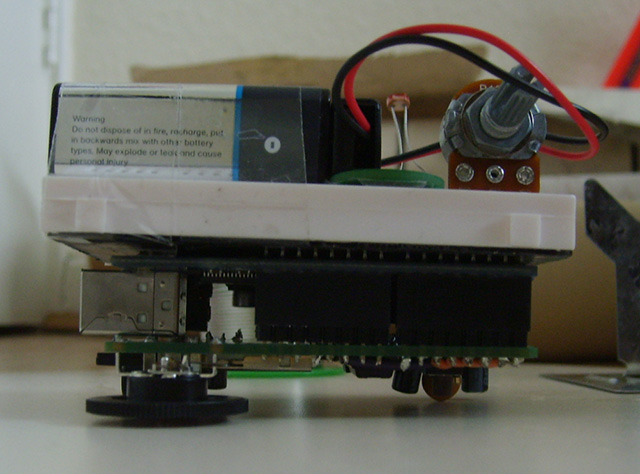
And here is a badly filmed short video:
The code for waveshield:
#include <FatReader.h>
#include <SdReader.h>
#include <avr/pgmspace.h>
#include "WaveUtil.h"
#include "WaveHC.h"
SdReader card; // This object holds the information for the card
FatVolume vol; // This holds the information for the partition on the card
FatReader root; // This holds the information for the filesystem on the card
FatReader f; // This holds the information for the file we're play
WaveHC wave; // This is the only wave (audio) object, since we will only play one at a time
#define DEBOUNCE 5 // button debouncer
//sensor setup
int vals[10];//for averaging capacitive sensor
int16_t lastpressval = 0;
#define HYSTERESIS 3
// this handy function will return the number of bytes currently free in RAM, great for debugging!
int freeRam(void)
{
extern int __bss_end;
extern int *__brkval;
int free_memory;
if((int)__brkval == 0) {
free_memory = ((int)&free_memory) - ((int)&__bss_end);
}
else {
free_memory = ((int)&free_memory) - ((int)__brkval);
}
return free_memory;
}
void sdErrorCheck(void)
{
if (!card.errorCode()) return;
putstring("\n\rSD I/O error: ");
Serial.print(card.errorCode(), HEX);
putstring(", ");
Serial.println(card.errorData(), HEX);
while(1);
}
void setup() {
byte i;
// set up serial port
Serial.begin(9600);
putstring_nl("WaveHC with sensor control");
//Serial.print(NUMBUTTONS, DEC);
//putstring_nl("buttons");
putstring("Free RAM: "); // This can help with debugging, running out of RAM is bad
Serial.println(freeRam()); // if this is under 150 bytes it may spell trouble!
// Set the output pins for the DAC control. This pins are defined in the library
pinMode(2, OUTPUT);
pinMode(3, OUTPUT);
pinMode(4, OUTPUT);
pinMode(5, OUTPUT);
// pin13 LED
pinMode(13, OUTPUT);
//init averaging array
for(int i=0 ; i < 10 ; i++) vals[i] = 0;
// if (!card.init(true)) { //play with 4 MHz spi if 8MHz isn't working for you
if (!card.init()) { //play with 8 MHz spi (default faster!)
putstring_nl("Card init. failed!"); // Something went wrong, lets print out why
sdErrorCheck();
while(1); // then 'halt' - do nothing!
}
// enable optimize read - some cards may timeout. Disable if you're having problems
card.partialBlockRead(true);
// Now we will look for a FAT partition!
uint8_t part;
for (part = 0; part < 5; part++) { // we have up to 5 slots to look in
if (vol.init(card, part))
break; // we found one, lets bail
}
if (part == 5) { // if we ended up not finding one :(
putstring_nl("No valid FAT partition!");
sdErrorCheck(); // Something went wrong, lets print out why
while(1); // then 'halt' - do nothing!
}
// Lets tell the user about what we found
putstring("Using partition ");
Serial.print(part, DEC);
putstring(", type is FAT");
Serial.println(vol.fatType(),DEC); // FAT16 or FAT32?
// Try to open the root directory
if (!root.openRoot(vol)) {
putstring_nl("Can't open root dir!"); // Something went wrong,
while(1); // then 'halt' - do nothing!
}
// Whew! We got past the tough parts.
putstring_nl("Ready!");
TCCR2A = 0;
TCCR2B = 1<<CS22 | 1<<CS21 | 1<<CS20;
//Timer2 Overflow Interrupt Enable
TIMSK2 |= 1<<TOIE2;
}
SIGNAL(TIMER2_OVF_vect) {
}
void loop() {
byte i;
int track = int(analogRead(0) / 170.67);
if(track == 0) playcomplete("4RAINS~1.WAV");
if(track == 1) playcomplete("5CELLO.WAV");
if(track == 2) playcomplete("6ANTON.WAV");
if(track == 3) playcomplete("3SHO0630.WAV");
if(track == 4) playcomplete("1DRUML~1.WAV");
if(track == 5) playcomplete("2JONGLY.WAV");
}
// Plays a full file from beginning to end with no pause.
void playcomplete(char *name) {
//store pressure value and newsamplerate
int16_t pressval;
uint32_t newsamplerate;
// call our helper to find and play this name
playfile(name);
while (wave.isplaying) {
pressval = abs(16000 - (average(analogRead(1)) * 456.25));//inverted, nomalized, avreahed, scaled
if ( ((pressval - lastpressval) > HYSTERESIS) || ((lastpressval - pressval) > HYSTERESIS)) {
newsamplerate = pressval; // scale it by the analog value
wave.setSampleRate(newsamplerate); // set it immediately!
Serial.println(newsamplerate, DEC); // for debugging
lastpressval = pressval;
}
}
// now its done playing
}
void playfile(char *name) {
// see if the wave object is currently doing something
if (wave.isplaying) {// already playing something, so stop it!
wave.stop(); // stop it
}
// look in the root directory and open the file
if (!f.open(root, name)) {
putstring("Couldn't open file "); Serial.print(name); return;
}
// OK read the file and turn it into a wave object
if (!wave.create(f)) {
putstring_nl("Not a valid WAV"); return;
}
// ok time to play! start playback
wave.play();
}
int average(int newVal){
int total = 0;
for(int i = 9; i > 0; i--) {
vals[i] = vals[i-1];
total += vals[i];
}
vals[0] = newVal;
total += vals[0];
return total *= .1;
}
A few more links
Along the way I've stumbled on a few interesting resources:
ArduinoBoy - Gameboy <> Arduino library
- Touch Screen on GBA
- Nice Arduino presentation including nice tips like:
- Freeduino - open-source Arduino-compatible
And that's it!
